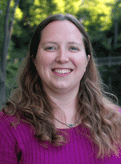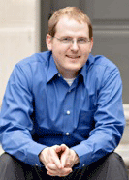![]() Republished with permission of Momentum,
Republished with permission of Momentum,
a School of Engineering electronic publication.
Dr. Jeffrey McCutcheon, an assistant professor in the Chemical & Biomolecular Engineering Department, is intent on bringing science, engineering and technology to a broader audience where preconceptions can be discussed openly and overturned. To that end, in April he launched a weekly, two-hour talk radio program on UConn’s noncommercial college and community radio station, WHUS (91.7 FM; www.whus.org/listen-live), called Science Friction.
He chose an edgy name to underline the show’s focus, which squarely targets scientific controversies. The program currently airs Mondays from 1-3 p.m. and reaches a listening audience well beyond the boundaries of the UConn campus. According to Ryan Caron King, the station’s general manager, “The geographic broadcast area of WHUS’s 4,400 watt signal reaches slightly past Hartford, into western Rhode Island and into southern Massachusetts.”
In explaining his decision to launch the radio show, Dr. McCutcheon says, “A gap exists between scientists and the general public, and some view science and technology as the doom of humanity. For example, there are debates about certain scientific issues such as climate change, nuclear power, alternative energy and water resources. I believe that by giving scientists a platform to discuss these controversies, we can allay some of the public’s fears surrounding technology and science.”
“I look at this as a platform much like NPR’s ‘Science Friday.’ Each week I present a different topic or series of topics covering all subjects STEM [science, technology, engineering, mathematics]. I interview students, professors, entrepreneurs, people from the business arena – and not just strictly from UConn but from around the country. It’s important to get a broad spectrum of individuals to talk about the challenges they face and see in certain areas, and to allay fears that nonscientists may have about these technologies.”
His shows have generated eager calls from listeners on either side of the topical debate, and he notes that most callers have been complimentary and respectful.
To date, Dr. McCutcheon, who directs the Sustainable Water and Energy Learning Laboratory (SWELL), has interviewed engineering professors Daniel Burkey, Mei Wei, and Allison MacKay; plus student leaders Kelsey Boch (’13), Breanne Muratori (’13) and Andrew Silva (’14). He has lined up six more programs for the summer, including interviews with professor Ranjan Srivastava, local businessman Kevin Bouley, Interim Engineering Dean Kazem Kazerounian and students participating in his NSF-sponsored Research Experiences for Undergraduates (REU), who will be carrying out novel research at UConn that has a business focus.
He notes that the radio show serves both the listening audience and the interviewees. “Very few people have the opportunity to be on the radio these days. Professors and scientists relish this opportunity to talk about what they do, and students value the opportunity as a singular life event.”
Radio is a life-long interest of Dr. McCutcheon’s, whose father, a professional guitarist, has hosted a classical guitar radio show for 20 years on public radio in Dayton, Ohio. “But what really got me into radio was listening to baseball games. I’m a big Cincinnati Reds fan and grew up listening to Marty Brennaman and Joe Nuxhall. When I was older, I began listening to news-talk radio. Radio is a great way to convey news, because radio broadcasts have to be clearer, in a way, than television broadcasts. Not to mention you can listen to radio anywhere, any time without it interfering with whatever you’re doing.”
Science Friction will play a central role in a proposal he is submitting to the National Science Foundation’s Early Career Development program. In his proposal, Dr. McCutcheon will articulate his intention to use this platform as a vehicle for broadening societal awareness of his research as well as that of other scientists, engineers and technologists.
Dr. McCutcheon is planning to make the show’s podcasts available via RSS feed to broaden listenership. He is eager to engage local teachers as well so that the program can reach students as they are beginning to examine scientific concepts and can learn from a spirited discussion involving alternate views.

 Kelly Burke joins the Chemical & Biomolecular Engineering Department, and has an appointment in the Polymer Program of the Institute of Materials Science. Dr. Burke, who joins UConn under the Eminent Faculty Initiative, earned her PhD at Case Western Reserve University in 2010 and brings expertise in protein modification strategies, tissue engineering, structure-property relationships of liquid crystals, and biocompatible multifunctional polymeric materials. Dr. Burke was a post-doctoral associate at Tufts University (2010-13), where she received an NIH National Research Service Award Fellowship.
Kelly Burke joins the Chemical & Biomolecular Engineering Department, and has an appointment in the Polymer Program of the Institute of Materials Science. Dr. Burke, who joins UConn under the Eminent Faculty Initiative, earned her PhD at Case Western Reserve University in 2010 and brings expertise in protein modification strategies, tissue engineering, structure-property relationships of liquid crystals, and biocompatible multifunctional polymeric materials. Dr. Burke was a post-doctoral associate at Tufts University (2010-13), where she received an NIH National Research Service Award Fellowship. Yongku Cho joins the Chemical & Biomolecular Engineering Department. He received his PhD from the University of Wisconsin – Madison in 2010. Dr. Cho’s research centers on protein engineering, optogenetics, neuroimaging and molecular neurobiology. He was most recently a post-doctoral researcher at the Massachusetts Institute of Technology, where his work involved the molecular engineering of light-activated proteins.
Yongku Cho joins the Chemical & Biomolecular Engineering Department. He received his PhD from the University of Wisconsin – Madison in 2010. Dr. Cho’s research centers on protein engineering, optogenetics, neuroimaging and molecular neurobiology. He was most recently a post-doctoral researcher at the Massachusetts Institute of Technology, where his work involved the molecular engineering of light-activated proteins. Luyi Sun joins the Chemical & Biomolecular Engineering Department, and has an appointment in the Polymer Program of the Institute of Materials Science. Dr. Sun, who joins UConn under the Eminent Faculty Initiative, received his PhD at the University of Alabama in 2004 and brings expertise in multi-functional nanostructured materials; polymeric materials and new polymer processing development; layered compounds; green science and engineering; hydrates and porous materials for energy storage. He was an assistant professor of chemistry at Texas State University (2009-13) and was a post-doctoral fellow at both Texas A&M and the University of Alabama.
Luyi Sun joins the Chemical & Biomolecular Engineering Department, and has an appointment in the Polymer Program of the Institute of Materials Science. Dr. Sun, who joins UConn under the Eminent Faculty Initiative, received his PhD at the University of Alabama in 2004 and brings expertise in multi-functional nanostructured materials; polymeric materials and new polymer processing development; layered compounds; green science and engineering; hydrates and porous materials for energy storage. He was an assistant professor of chemistry at Texas State University (2009-13) and was a post-doctoral fellow at both Texas A&M and the University of Alabama. Julia Valla joins the Chemical & Biomolecular Engineering Department with expertise in the design and development of novel catalysts for industrial applications and design of new, emerging technologies and processes for the clean and sustainable energy production. She earned her PhD at Aristotle University of Thessaloniki, Greece in 2005. Dr. Valla was previously an assistant research professor in CMBE and the Center for Clean Energy Engineering and, earlier in her career, a Project Leader for Rive Technology Inc.
Julia Valla joins the Chemical & Biomolecular Engineering Department with expertise in the design and development of novel catalysts for industrial applications and design of new, emerging technologies and processes for the clean and sustainable energy production. She earned her PhD at Aristotle University of Thessaloniki, Greece in 2005. Dr. Valla was previously an assistant research professor in CMBE and the Center for Clean Energy Engineering and, earlier in her career, a Project Leader for Rive Technology Inc. Kristina Wagstrom joins the Chemical & Biomolecular Engineering Department as the Northeast Utilities Assistant Professor of Environmental Engineering Education. She brings expertise in sourcing and modeling atmospheric particulates, air pollutants, health impacts of atmospheric particulate matter deposition, and air quality models. Dr. Wagstrom received her PhD from Carnegie Mellon University in 2009. She conducted post-doctoral research at the University of Minnesota (2009-12), and was an AAAS Science and Technology Policy Fellow at the U.S. EPA (2012-13).
Kristina Wagstrom joins the Chemical & Biomolecular Engineering Department as the Northeast Utilities Assistant Professor of Environmental Engineering Education. She brings expertise in sourcing and modeling atmospheric particulates, air pollutants, health impacts of atmospheric particulate matter deposition, and air quality models. Dr. Wagstrom received her PhD from Carnegie Mellon University in 2009. She conducted post-doctoral research at the University of Minnesota (2009-12), and was an AAAS Science and Technology Policy Fellow at the U.S. EPA (2012-13).




 Dr. George Bollas, an assistant professor in the Department of Chemical and Biomolecular Engineering, is the recipient of a prestigious ACS Petroleum Research Fund Doctoral New Investigator Award. The ACS PRF programs support innovative research in the petroleum field and promote the development of promising engineers and scientists. The award program provides career opportunities to young faculty and their undergraduate and graduate students by supporting advanced scientific research. The goals of the American Chemical Society Petroleum Research Fund are to support fundamental research in the petroleum field and develop the next generation of engineers and scientists through the support of advanced scientific education.
Dr. George Bollas, an assistant professor in the Department of Chemical and Biomolecular Engineering, is the recipient of a prestigious ACS Petroleum Research Fund Doctoral New Investigator Award. The ACS PRF programs support innovative research in the petroleum field and promote the development of promising engineers and scientists. The award program provides career opportunities to young faculty and their undergraduate and graduate students by supporting advanced scientific research. The goals of the American Chemical Society Petroleum Research Fund are to support fundamental research in the petroleum field and develop the next generation of engineers and scientists through the support of advanced scientific education.

 In Capstone Design, our seniors are mentored by chemical engineering faculty and industry sponsors as they apply engineering fundamentals and tools to solve practical engineering problems. Students use this experience to develop teamwork and communication skills as they tackle their open-ended, real-world challenges. They learn about the principles and practices of design, setting priorities, project management, ethical and economic decision making, intellectual property, oral and written communication, all as they evaluate their design from a technical, economic, safety, and environmental perspective.
In Capstone Design, our seniors are mentored by chemical engineering faculty and industry sponsors as they apply engineering fundamentals and tools to solve practical engineering problems. Students use this experience to develop teamwork and communication skills as they tackle their open-ended, real-world challenges. They learn about the principles and practices of design, setting priorities, project management, ethical and economic decision making, intellectual property, oral and written communication, all as they evaluate their design from a technical, economic, safety, and environmental perspective. During a gala event on May 2 at the Storrs campus, the School of Engineering honored 10 exceptional alumni and friends as 2013 inductees into the UConn Academy of Distinguished Engineers. Nearly 100 attendees helped to honor the new inductees, each of whom spoke of the profound influence of UConn Engineering in shaping their careers. One inductee was an alumnus of the Chemical Engineering department, John Prior.
During a gala event on May 2 at the Storrs campus, the School of Engineering honored 10 exceptional alumni and friends as 2013 inductees into the UConn Academy of Distinguished Engineers. Nearly 100 attendees helped to honor the new inductees, each of whom spoke of the profound influence of UConn Engineering in shaping their careers. One inductee was an alumnus of the Chemical Engineering department, John Prior.